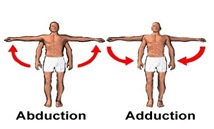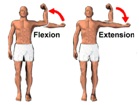Main Menu
Latest Blog Entry
User login
Glossary of Terms
Glossary of Strength and conditioning terms
Some athletic words that might help you study or revise better.
Abduction – Movement of a limb away 
from the middle of your body.
E.g. lifting your arms up (Extension at
the shoulder) as if you were imitating an airplane!
Adduction – movement of a limb towards the middle of your body. E.g. bringing your arms back down (Flexion at the shoulder) to your sides.
Absolute Strength – the biggest load a person can lift 
in one repetition.
Aerobic Exercise – Activity in which the body supplies oxygen to working muscles for a period of time i.e. marathon running, cross country skiing.
Anaerobic Exercise – Activity which requires more oxygen than the body can supply (without oxygen). Results in the buildup of Lactic Acid. Used for short sharp bursts i.e. sprints, long jump.
Barbell – A long bar in which weights are placed on either end and used for exercise.
Basal Metabolic Rate – the amount of energy your body uses at rest to perform basic bodily functions. It changes depending on weight, height, age, gender, diet and exercise.
Body composition – The breakdown of your body’s makeup, proportions of fat, lean muscle, water and water.
Clean – Weightlifting exercise where weight is lifted
from floor to shoulder in one movement.
Snatch – Weightlifting exercise where weight is lifted from floor to overhead in one movement.

Clean and Jerk – Weightlifting exercise where weight is lifted from floor to overhead in two movements.
Concentric Contraction – muscle shortens whilst being used
Deadlift – Weightlifting exercise where weight is lifted from floor to waist height, with back straight.
Dumbbell – Weights about 14” long with load at either end.
Eccentric Contraction – Muscle lengthens whilst being used.
Endurance – The ability to sustain an exercise for a  prolonged length of time, can be either anaerobic
prolonged length of time, can be either anaerobic
endurance or aerobic endurance.
Fartlek Training – A type of interval training, varying the speed or intensity during exercise. Places stress on aerobic and anaerobic systems.
Extension – A body part going from a 
bent position to a straight position
Flexion – A body part going from a
straight position to a bent position.
Fast Twitch – Muscle fibre type that fires quickly, good for sprinting and power lifting.
Glycogen – The energy fuel that carbohydrate is stored as in the body.
Heart Rate training Zones – Classifying training zones dependent upon physiological changes during exercise. E.g. knowing what heart rate (or % HR max) the lactate Threshold occurs and what heart rate corresponds with maximal oxygen uptake.
Hypertrophy – The growth/getting bigger of muscle.
Isometric Exercise – Muscle contraction where the muscle stays at the same length and the joint does not move. i.e. pushing against a wall.
Isotonic Exercise – A form of exercise that results in the muscles lengthening or shortening but the tension remaining the same. Lifting free weights is a classic isotonic exercise.
Lactic acid – Produced during anaerobic 
exercise, contributes to fatigue.
Lactate Threshold – The intensity at which you can sustain an exercise at before lactic acid is produced.
Maximal Oxygen uptake – The maximal amount of oxygen that the body can utilise and supply to working muscles. Also known as VO2 max and aerobic capacity.
Overtraining – A state at which you are underperforming due to too much training and not enough recovery time. It is a physical and psychological problem.
Power – Strength + Speed.
Repetition Maximum (1RP) – Similar to absolute strength, the maximum you can lift in one go.
Slow Twitch – Muscle cells that contract slowly and are resistant to fatigue. Good for long distance running or swimming.
Super set – Alternating back and forth between two or more exercises until a number of sets are completed.
If you want to learn how to apply them, look at our accredited strength and conditioning courses
Client Testimonials
 Paul Mitchell Golf Academy
Paul Mitchell Golf Academy
With twenty plus years golf coaching experience working with all levels of golfer, I have sought after specific physical training for my more elite players. In this quest, I have worked alongside trainers who have worked with the very best golfers in the world. I can hand on heart say that James is the […]
More

